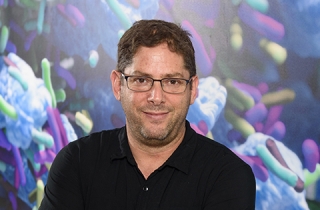Over a billion people around the world smoke tobacco and six million of them die in an average year. In Israel, the annual death toll from cigarettes and other forms of addictive tobacco is 8,000 people, a tenth of them non-smokers who were exposed to others’ smoke.
Many people don’t kick the habit, even though they want to, because they are concerned about the substantial weight gain that often accompanies smoking cessation. The cause of this weight gain is unclear, as studies suggest that most people don’t eat more after quitting smoking.
In a study just published in the prestigious journal Nature, researchers at the Weizmann Institute of Science in Rehovot report their discovery that obesity developing after “smoking cessation” in mice may be driven by the weight-modulating compounds released by the bacteria in the gut (microbiome).
“Our findings exemplify how the host and microbiome act as partners in regulating weight and metabolism,” said Prof. Eran Elinav of Weizmann’s immunology department who headed the research team. “The compounds we have identified may lead to new treatments that will help people avoid weight gain when quitting smoking. Moreover, these compounds may be further developed into therapies to fight obesity even among nonsmokers.”
Leviel Fluhr, Uria Mor, and Dr. Hagit Shapiro of Elinav’s lab led this project, together with additional lab members and other Weizmann scientists.
The researchers found that mice that were regularly exposed to cigarette smoke failed to gain weight, despite eating food high in fat and sugar. When their exposure to tobacco smoke ended, the mice quickly gained weight, as often happens to humans who quit smoking.
But when the mice were given broad-spectrum antibiotics that depleted their microbiome, they gained much less weight after undergoing “smoking cessation,” staying slim for months regardless of their diet. Evidently, smoking-related compounds such as nicotine penetrated the gut of “smoking” mice from the bloodstream, thereby changing the gut’s bacterial composition and, consequently, the body’s metabolism.
To confirm that the gut microbes were indeed major regulators of weight gain in the “smoking cessation” mice, the researchers collected microbiomes from “smoking” or “smoking-cessation” mice at various points of time and transferred these into germ-free mice that had never been exposed to cigarette smoke.
The recipient mice developed microbial imbalances similar to those observed in “smoking” mice and gradually gained weight, a phenomenon that was greatest in mice transplanted with microbiomes collected during the smoking cessation period. Significantly less weight gain occurred when the donor “smoking” mice were treated with antibiotics before the transplants.
Next, the researchers characterized the thousands of potentially bioactive metabolites – intermediate products of metabolic reactions catalyzed by various enzymes that naturally occur within cells –generated or altered by the microbiome when the mice were exposed to cigarette smoke. They identified two small molecules that might explain the metabolic consequences of smoking cessation.
One was dimethylglycine (DMG), a metabolite generated from the dietary nutrient choline by the gut microbiome and the liver. DMG production was enhanced during active exposure to cigarette smoke, but it was substantially reduced when the gut microbiome of “smoking” mice was depleted by antibiotics.
When these antibiotic-treated mice (which are depleted of DMG) were given a DMG supplement, their ability to gain weight returned as soon as they were no longer exposed to cigarette smoke, apparently because the compound increased what’s known as “energy harvest,” the amount of food-derived energy that is taken up by the body. When the mice were fed a diet deficient in choline, that is, lacking precursors required for DMG production, they failed to gain weight after “smoking cessation.”
The second bioactive metabolite, acetylglycine (ACG), followed a mirror-image pattern to that of DMG: Its levels were reduced during active exposure to smoke and after the exposure stopped, they increased following antibiotic treatment. When mouse “ex-smokers” (that normally feature low ACG levels) were given an ACG supplement, they failed to gain weight upon “smoking cessation,” suggesting that ACG acted in this context as a weight-reducing metabolite.
The researchers further showed that the two molecules were able to modify weight even in a nonsmoking setting. Giving DMG to “nonsmoking” mice resulted in a modest weight gain, while adding ACG to the diet-induced a significant weight loss in nonsmoking obese mice, combined with improvement in several other measurable metabolic factors.
A genomic analysis of the mouse fat tissue suggested that DMG and ACG produced opposite effects – one activating a genetic program related to obesity, the other a program related to weight loss. More studies are needed to elucidate the mechanisms by which these molecules affect mammalian metabolism, the researchers said.
Finally, the researchers assessed the microbiomes of 96 people who smoking and who are nonsmokers. They found marked alterations in the microbiome of smokers, as well as microbial metabolite changes that were similar to those found in the mouse “smokers,” including increased levels of DMG and its intermediate products. more studies will have to investigate whether these or other metabolites produced by the smoking-influenced microbiome contribute to weight gain after smoking cessation in humans.
“The profound impact that our microbial tenants have on our body never ceases to amaze us,” Elinav concluded. “Our findings shed new light on how the microbiome interacts with the human body in regulating our weight and metabolism, in ways that may be therapeutically exploited.”
The shortcode is missing a valid Donation Form ID attribute.




